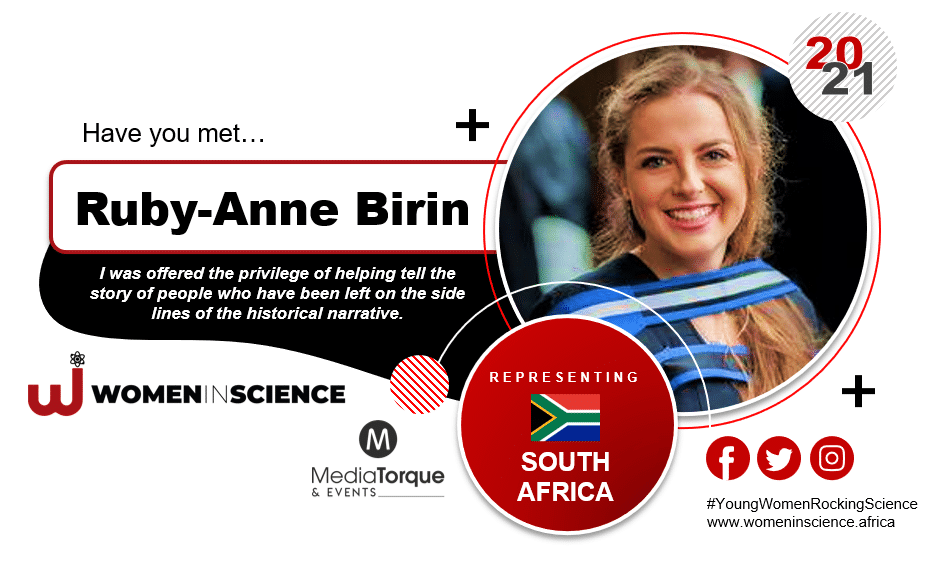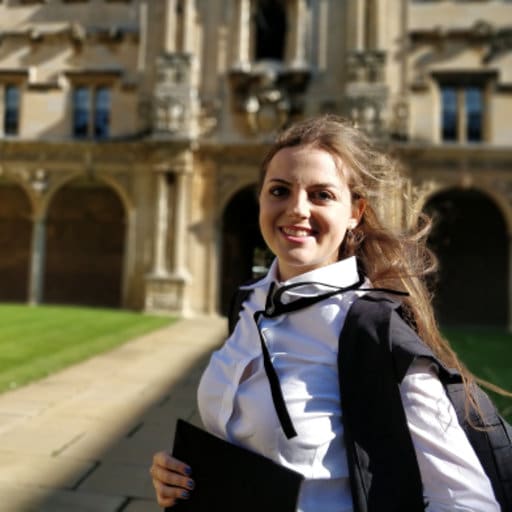Ruby-Anne Birin has always been fascinated by science when she was growing up. Playing around and exploring her surroundings was her favourite past time. As she grew older so was her love and passion for science. While in Grade 11 at the age of 17, she went to Oxford for summer school.
The visit exposed her to new ways of thinking and other possible career paths she could pursue to fulfil her longstanding interest and childhood dream. “Science helps bring meaning to our complex past and predict and shape our environment for the future,” said Birin.
Two years later after her life-changing trip to the summer school, she enrolled for a BSc. degree in geography and archaeological sciences at the University of the Witwatersrand (Wits). “Wits transformed my understanding of South Africa. Throughout my degree, I made meaningful connections with peers from diverse backgrounds. During this time, I partook in laboratory work and excavations in South African, Israel and Italy,” says Birin.

“Here, I helped excavate the first Philistine cemetery from 2700 years ago. Throughout the excavation, I was offered the privilege of helping tell the story of people who have been left on the side lines of the historical narrative. They were no longer the side characters but were their own heroes.”
She says through archaeology, we gain insight into our shared and diverse narratives that shape our world today. “Through this understanding we can use other social and physical sciences to find solutions to overcome existing obstacles while paving a way for an exciting future,” explains Birin.
She says these experiences taught her the importance of meaningfully engaging with people – whether in science or humanities. Birin says as part of her BSc. archaeology (Hons) degrees, under the mentorship and guidance of Dr Mary Evans and Professor Alex Schoolman; she applied luminescence dating to understand the construction and habitation of two homesteads in Bokoni, Mpumalanga.
Birin then went to the University of Oxford to do her MSc degree in archaeological science. She expanded her training in luminescence dating to explore the timing of the early Middle Stone Age at Wonderwerk Cave in the interior of South Africa. Upon completion, she was accepted to do a DPhil in archaeological science at Oxford.
The focus of her DPhil was aimed at understanding the changes of southern African Middle Stone Age technology (300 000 to 30 000 years ago) through space and time. Birin says the research will help understand when, how (and maybe why) people moved across the landscape during our complex past.
She considers herself lucky to have been guided and trained by caring and supportive female supervisors. “I was trained by strong, inspiring women who became important role models in conducting myself as a professional and an individual,” she says.

Birin says as an archaeologist she is also fortunate to have a wide range of adventures. She singles out her first excavation in Ashkelon, Israel as having had a profound impact on her. “Here, I helped excavate the first Philistine cemetery from 2700 years ago. Throughout the excavation, I was offered the privilege of helping tell the story of people who have been left on the side lines of the historical narrative. They were no longer the side characters but were their own heroes,” she says.
Consequently, in my research, I have made sure that I am acting responsibly and ethically towards the people who I am trying to understand, Birin says. “Irrespective of country or culture, I try to centre them in the narrative rather than myself. More recently, I published my first academic article accompanied by a public engagement piece in The Conversation. These articles gave me a taste of a professional academic career,” says Birin.
She shared some of the practical tips and professional messages with the generations of women scientists who want to get into science. “To pursue any science, especially a field-based one, you need to love what you do and follow your instincts. Becoming an archaeologist is about combining multiple interests to understand our complex history and how this impacts our lives today,” advises Birin.







